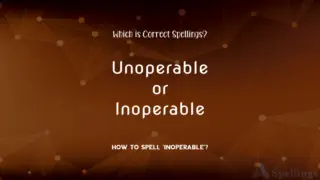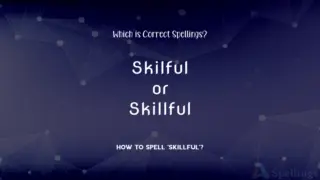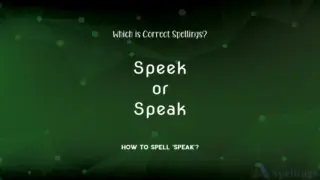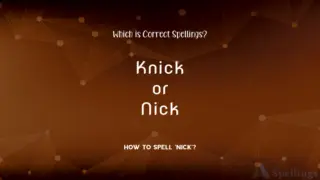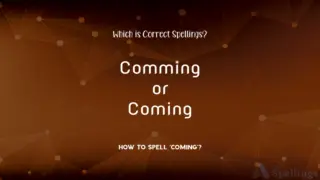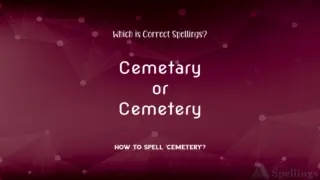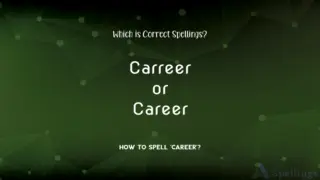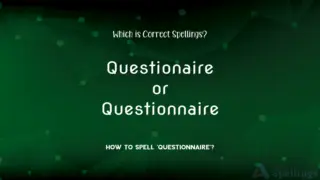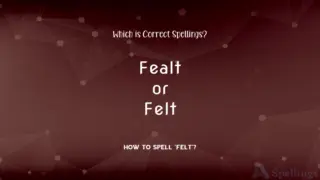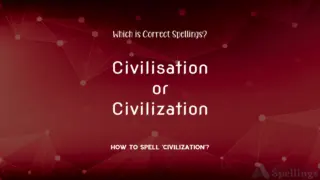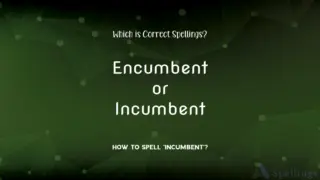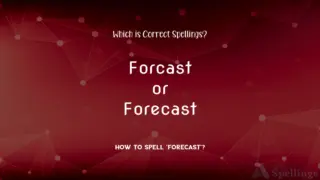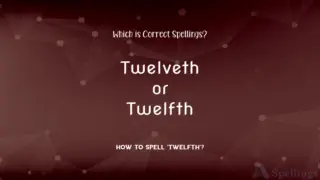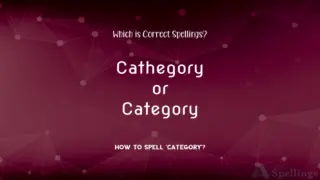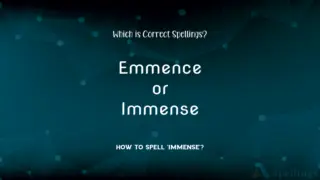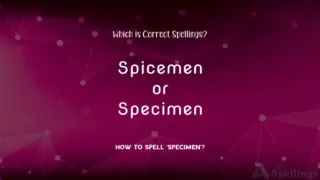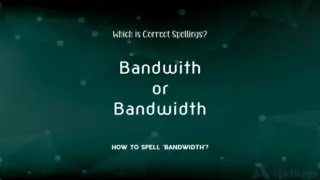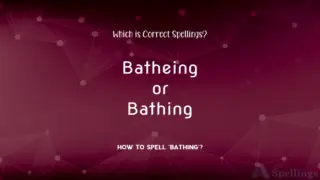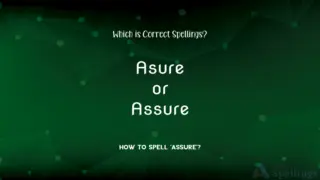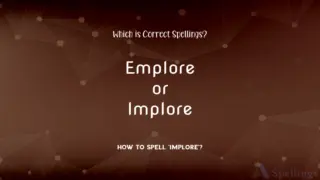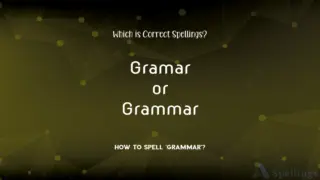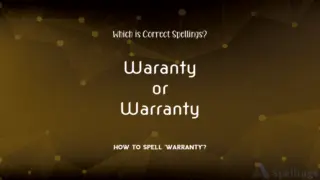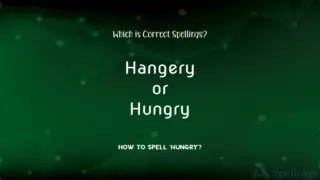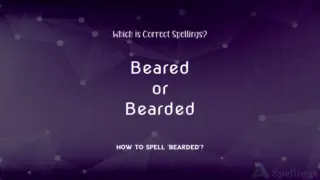Completley or Completely: Which is Correct Spellings?
The incorrect spelling is "completley," while the correct spelling is "completely," meaning totally or entirely.
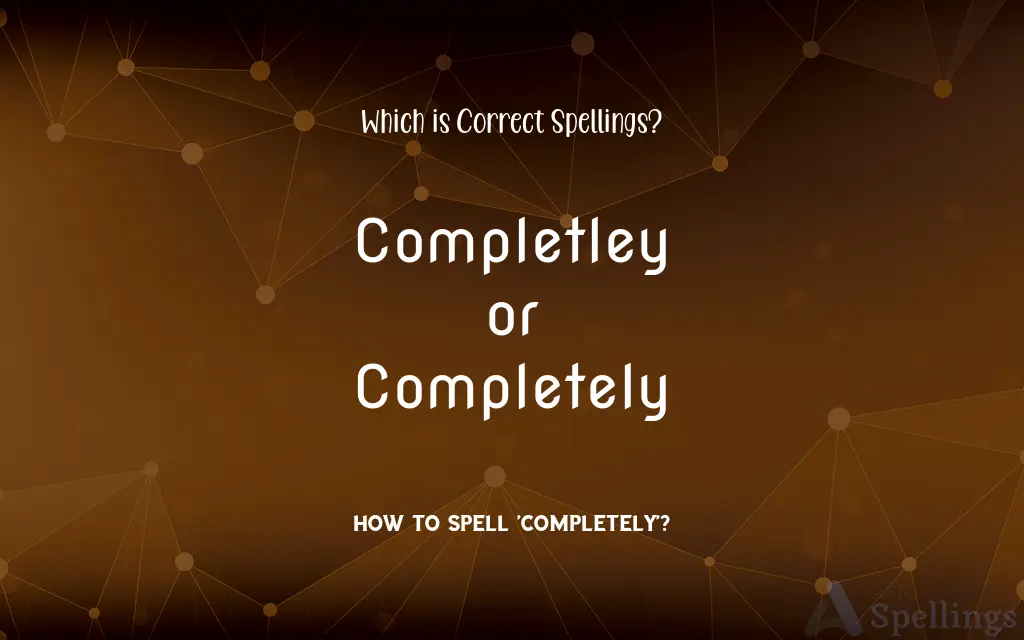
Which is correct: Completley or Completely
How to spell Completely?

Completley
Completley Spelling

Completely
Completely Spelling
Table of Contents
Is it Completley or Completely
Remember the phrase "complete lie," which sounds like "completely," reinforcing the correct 'e' before 't.'
The 'e' comes before the 't' in both "complete" and "completely."
Think of "completely" as being "complete" with a 'ly' at the end, keeping the 'e' and 't' together as in the original word.
The word "complete" forms "completely" by adding 'ly,' without changing the order of 'e' and 't.'
"Completely" ends in "ly," as many adverbs do, indicating the manner of something.
How Do You Spell Completely Correctly?
Incorrect: She completley forgot about the appointment.
Correct: She completely forgot about the appointment.
Incorrect: He was completley unaware of the surprise party planned for him.
Correct: He was completely unaware of the surprise party planned for him.
Incorrect: I'm completley satisfied with the work you've done.
Correct: I'm completely satisfied with the work you've done.
Incorrect: The room was completley dark when she entered.
Correct: The room was completely dark when she entered.
Incorrect: The movie was completley different from the book.
Correct: The movie was completely different from the book.
Completely Definitions
Entirely; in every way or as much as possible.
The garden was completely transformed.
To a total or absolute extent.
They were completely amazed by the magician's trick.
Used for emphasizing that something is very thorough or extreme.
The city was completely deserted at night.
To the fullest extent or degree.
The puzzle was completely finished.
In a complete manner; thoroughly.
He was completely soaked from the rain.
Completely Meaning in a Sentence
The room was completely silent during the test.
She had completely forgotten about the meeting.
The book was completely different from what I expected.
His answer completely surprised everyone.
They completely cleaned their room without being asked.
The sky was completely clear of clouds.
She was completely wrapped up in her book.
The artwork was completely made of recycled materials.
The story was completely fascinating to the children.
I completely agree with your point of view.
She was completely focused on her homework.
The field trip completely changed how they saw history.
He was completely honest in his report.
The homework assignment was completely done on time.
The game was completely fair and well-played.
I'm completely ready for the science fair.
The movie's ending was completely unexpected.
He was completely lost in his daydream.
The park was completely peaceful in the early morning.
The ice cream melted completely in the sun.
The song was completely stuck in her head.
He completely understood the math concept after the lesson.
His kind gesture completely made her day.
The old house was completely renovated.
Her room was completely organized after a day of cleaning.
The magician's act completely captivated the audience.
The team completely dominated the game from start to finish.
I was completely unaware of the time passing.
The streets were completely empty late at night.
They were completely prepared for the hike.
Completely Idioms & Phrases
Completely off the mark
Totally incorrect or inaccurate.
His answer was completely off the mark; the capital of France is Paris, not London.
Completely in the dark
To be completely unaware or uninformed.
We were completely in the dark about the surprise party being planned.
Completely over the moon
Extremely happy or delighted.
She was completely over the moon after hearing the news of her promotion.
Completely out of the blue
Happening unexpectedly.
His decision to move to Canada came completely out of the blue.
Completely beside oneself
To be overwhelmed with emotion.
She was completely beside herself with joy at the birth of her granddaughter.
Completely on board
Fully agreeing or supportive.
The team was completely on board with the new strategy.
Completely out of hand
Out of control.
The situation got completely out of hand and the police were called.
Completely out of character
Not typical of a person's usual behavior.
Yelling at the cashier was completely out of character for him.
Completely off the grid
Not connected to utilities or communication systems.
They lived completely off the grid in a remote mountain cabin.
Completely off the beaten track
Located away from popular areas.
They enjoyed their vacation in a cottage that was completely off the beaten track.
Completely round the bend
Crazy or insane.
You must be completely round the bend if you think I'm going to agree to that!
Completely out of the woods
No longer in danger or difficulty.
After the successful surgery, he's not completely out of the woods yet.
Completely out of one’s depth
To be in a situation that is too difficult to handle.
He felt completely out of his depth in the advanced math class.
Completely by the book
To do something according to the rules.
The inspector did everything completely by the book.
Completely in one's element
To be in a situation that one knows well and enjoys.
He's completely in his element when he's cooking.
Completely out on a limb
In a position that is not supported by others.
He went completely out on a limb with his controversial theory.
Completely over the top
Excessive or too extreme.
The decorations were completely over the top for a simple birthday party.
Completely at a loss
Unsure how to act or respond.
I was completely at a loss for words when I saw the painting.
Completely under the weather
Feeling ill or sick.
I'm completely under the weather today, so I can't come to work.
Completely down to earth
Practical and realistic.
Despite her fame, she’s completely down to earth.
Common Curiosities
What is a stressed syllable in completely?
The stressed syllable in "completely" is the second syllable: plete.
What is the pronunciation of completely?
The pronunciation of "completely" is /kəmˈpliːtli/.
Which vowel is used before completely?
The vowel used before "completely" depends on the context and what word precedes it.
Is completely a negative or positive word?
"Completely" is neutral; it can be used in both positive and negative contexts.
Is completely a countable noun?
"Completely" is not a noun; it is an adverb.
What is the root word of completely?
The root word of "completely" is "complete."
What is the verb form of completely?
"Completely" is an adverb and does not have a verb form. The verb form of the adjective "complete" is "complete."
Is completely an adverb?
Yes, "completely" is an adverb.
How many syllables are in completely?
There are three syllables in "completely."
How do we divide completely into syllables?
Completely is divided into syllables as com-plete-ly.
Is completely a noun or adjective?
"Completely" is an adverb.
Is the completely term a metaphor?
The word "completely" can be used metaphorically, but it is not a metaphor in itself.
Is completely an abstract noun?
No, "completely" is not a noun; it is an adverb.
Is the word completely is imperative?
No, "completely" is not an imperative; it is an adverb.
What is another term for completely?
Another term for "completely" is "entirely" or "wholly."
Which determiner is used with completely?
Determiners are not typically used with adverbs like "completely."
What is the plural form of completely?
"Completely" does not have a plural form; it is an adverb.
Is completely a collective noun?
"Completely" is not a noun; it is an adverb.
What part of speech is completely?
"Completely" is an adverb.
What is the singular form of completely?
"Completely" does not have a singular or plural form as it is an adverb.
Which preposition is used with completely?
Prepositions are not typically used with "completely" as it is an adverb.
Which article is used with completely?
Articles are not used with "completely" because it is an adverb.
Is the word completely Gerund?
No, "completely" is not a gerund; it is an adverb.
Why is it called completely?
It is called "completely" to denote that something is done or achieved in a whole or total manner.
What is the opposite of completely?
The opposite of "completely" could be "partially" or "incompletely."
Is completely a vowel or consonant?
"Completely" is a word and not classified as a vowel or consonant.
Is the word “completely” a Direct object or an Indirect object?
"Completely" cannot be a direct or indirect object as it is an adverb.
How is completely used in a sentence?
The renovation was completely finished by the deadline.
Which conjunction is used with completely?
Conjunctions such as "and" or "but" can be used in sentences with "completely."
Share Your Discovery
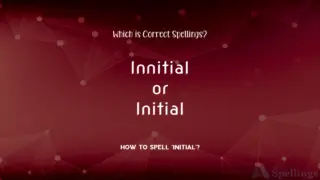
Previous Spelling
Innitial or Initial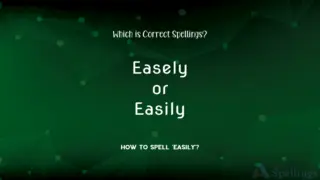
Next Spelling
Easely or Easily
